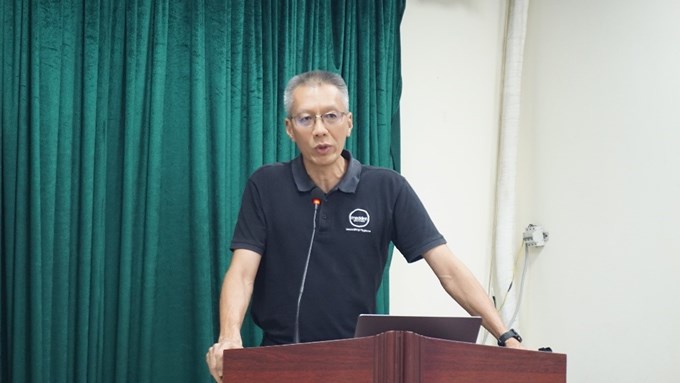Controlling foodborne pathogens in food processing facilities is essential not only for safeguarding public health but also for bolstering Vietnam's food import and export activities. To provide a foundational understanding of foodborne pathogens caused by harmful microorganisms, and to explore effective strategies and best practices, the Microbiology and Food Safety Research Group, in collaboration with Malaysian experts, hosted a seminar on September 4, 2024, titled "Foodborne Pathogen Control in Food Processing Premises".
The seminar also featured presentations on cutting-edge techniques, including ozone technology, rapid laboratory testing methods, and cloud-based data systems, offering participants valuable insights into the latest advancements in the field.
Distinguished speakers from Malaysia who contributed to the seminar included:
- Mr. Chandraprasad S Rajangan, Managing director of Everest 23 Professional Solutions Sendirian Berhad
- Mr. Lu Kok Wah, Executive of Medklinn International Sendirian Berhad
- Mr. Wong Lian Hin and Mr. Muhammad Arif Bin Kamaruddin from Perfect Laboratory Sendirian Berhad
The training course brought together leaders and technical experts from 15 companies in the food processing sector, as well as lecturers and researchers from 5 universities and institutes, including members of the Microbiology and Food Safety Research Group from the Faculty of Food Technology at the Vietnam National University of Agriculture.
In her welcome speech, Assoc. Prof. Dr. Nguyen Thi Thanh Thuy, Head of the Microbiology and Food Safety Research Group, warmly greeted the participants and underscored the significance of controlling foodborne pathogens in food processing facilities to safeguard public health.
    |
 |
| Mr. Chandraprasad S. Rajangan, Managing director of Everest 23, delivered an insightful presentation on various topics related to foodborne pathogen control in food processing facilities. |
At the seminar, Mr. Chandraprasad S. Rajangan, Managing director of Everest 23, delivered an insightful presentation on various topics related to foodborne pathogen control in food processing facilities. The key points included:
1. Causes and Impact of Foodborne Pathogens: Pathogens can enter the food supply chain from animals, plants, or the environment. Factors such as temperature, storage time, environmental conditions, and food handling practices all influence pathogen growth and spread.
2. Pathogen Control Strategies: (i) Prevention: Managing raw materials, mitigating external environmental factors, training staff, and implementing Environmental Monitoring Programs (EMP). (ii) Prediction: Utilizing data and intuition to enhance preventive measures, prepare for unforeseen circumstances, and assess new suppliers.
3. Environmental Monitoring Program (EMP): EMP is a critical component of a food safety program, aiding in the detection of pathogens or spoilage organisms in the environment before they contaminate food products. The EMP process involves planning, implementation, inspection, and taking action based on data analysis results.
4. Application of Digital Technology in Pathogen Control: Employing Cloud-Based Systems (CBS) to collect and analyze data, enabling quick, accurate decision-making. Digital technology supports data analysis, laboratory automation, and the enhancement of food safety standards.
5. Best Practices in Pathogen Control: Improving Good Manufacturing Practices (GMP) and production processes to minimize cross-contamination risks, along with the continuous evaluation and optimization of EMP to increase pathogen control effectiveness.
The Malaysian expert also demonstrated the use of ozone treatment systems in food plants and rapid laboratory testing techniques, which garnered significant interest from participants in the food production and processing industry.
The speaker's presentation enhanced attendees' foundational understanding of foodborne pathogens, equipping them to apply control strategies for major pathogens and integrate the latest technologies into food processing plants.
    |
 |
| Mr. Lu Kok Wah demonstrated the use of ozone treatment systems in food plants and rapid laboratory testing techniques, which garnered significant interest from participants in the food production and processing industry |
The session concluded with a lively Q&A, where attendees posed numerous questions to the speakers about hazard control measures in food plants. The speakers offered valuable suggestions and provided free tools to facilitate easier and more accurate pathogen control. The seminar successfully raised awareness of foodborne pathogens and fostered collaboration between businesses and scientists in the field of food safety.
Microbiology and Food Safety Research Group